Co-curricular (At home)
Residential education & Internationalization: house of intercultural living and learning programme– Mr. Ivan Chung (HKPU)
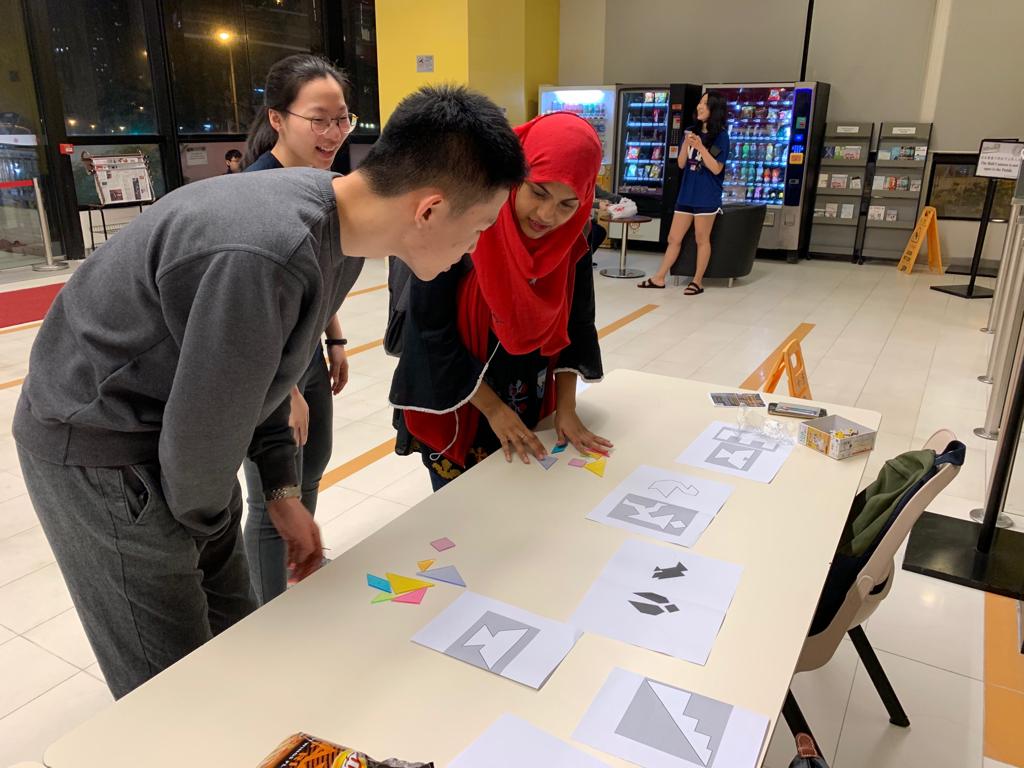
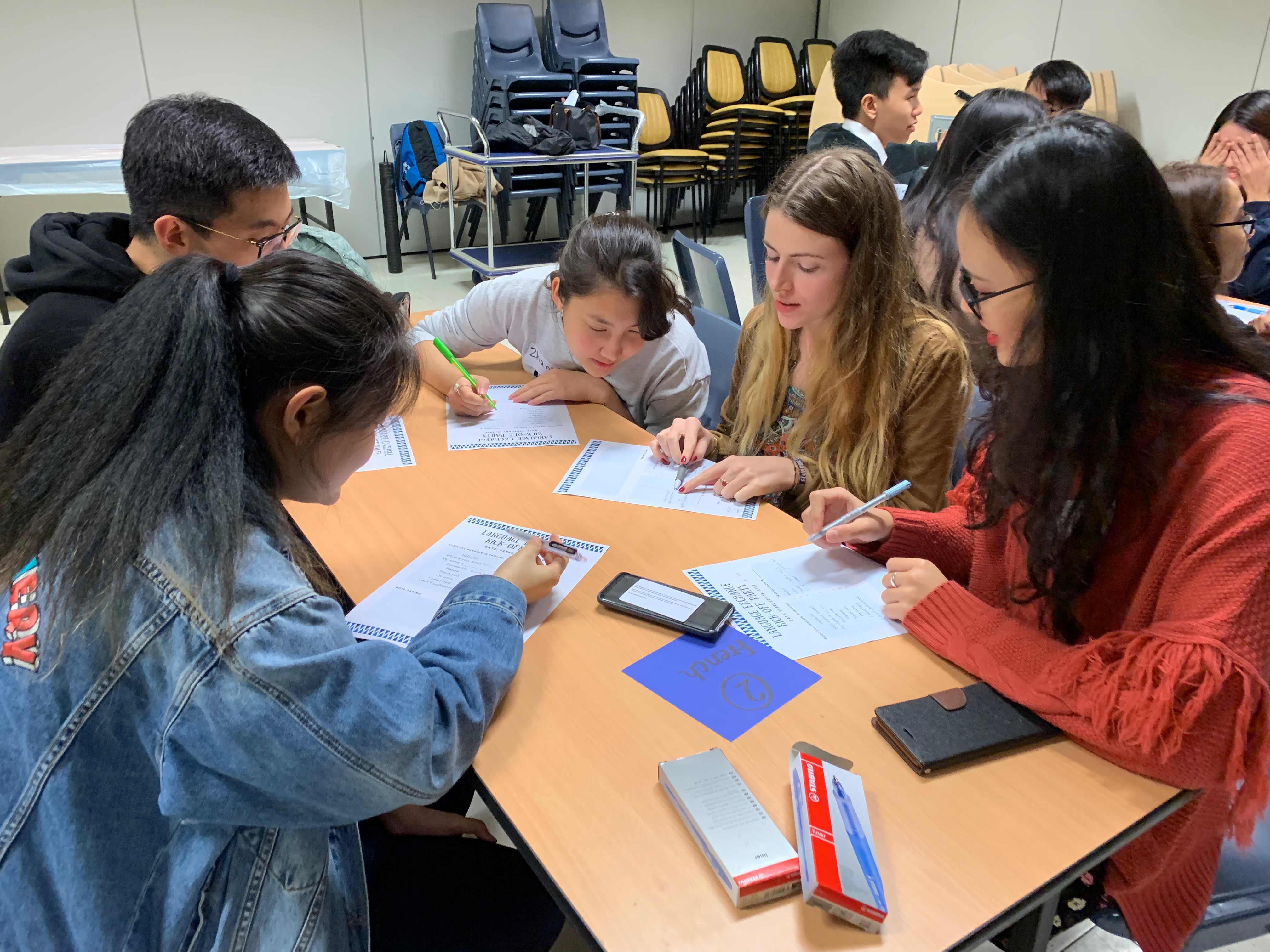
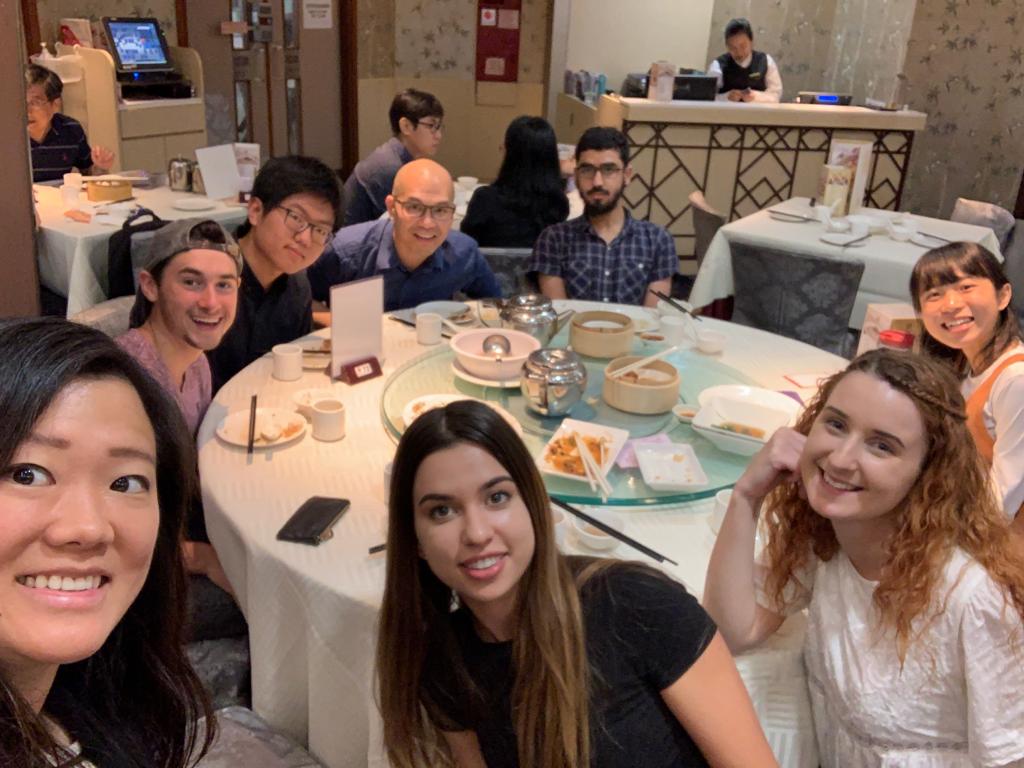
Case summary: This House of Intercultural Living and Learning (HILL) Programme aims to enhance students’ holistic development and competence in areas of whole-person, intercultural and servant-leadership. The programme will combine intercultural skills with other areas of development such as self-awareness, communication, and emotional health. It also attempts to internationalise the co-curriculum in a more intense format and is geared toward intercultural practice and not research. Surveys will be based on key learning outcomes and will be used to determine if students show a significant increase in intercultural skills and intelligence after participating in the programme. Assessments of intercultural skills will be well-researched and validated. The challenge will be to perpetuate this intercultural practice on a broader scale going forward. This initiative was evaluated by pre- and post-survey, focus group interviews, and Cultural Intelligence Centre. Two possible assessment approaches for student learning outcome: (A) Assessing students going to each module at pre- and post-survey of that specific module; (B) Assessing all students eventually take one or more modules, we will take the 100 students that have gone through most modules and assessing them at the end. Two possible enduring impacts: (1) Systemic change in University co-curricular learning beyond the classroom. If the “Pilot” Programme is successful, there will be more funding for residential education personnel and programmes, as well as re-adjusted wardens’ roles. (2) Graduates of this 3-year Programme will document via e-portfolio the breadth of their experiences for future employers, the University itself.
A Study of Non-Local Student’s Perspectives on Cultural Adjustment: Host Family Scheme in Hong Kong context – Dr. Eric Tam (HKPU)
case summary: To enrich the experience of non-local new students, the Non-local Student Services Team (NLSST) of the Student Affairs Office organizes the Host Family Scheme for Non-local Students with support from PolyU Staff Evangelistic Mission (SEM) for Mainland Students and Institute of Active Ageing (IAA) for International Students. Successful applicants of this scheme will be introduced to a PolyU staff or alumni or professional recognized by PolyU and be invited to join these host families occasionally to experience family life, customs ideas and values in Hong Kong. Pre-assessment will be conducted with participating students at the onset of the programme by means of a questionnaire or during student selection interviews or matching sessions or briefing sessions or at the onset of event/activities); Post-assessment will be conducted to examine students’ experience on intercultural contact/ communication, cultural understanding, and adaption; assessment can be done during focus-group interviews or sharing sessions or at the end of event/activities, or data can be collected from reports submitted by participating students or through the online survey; and assessment data will be analysed to examine any change of students’ socio-cultural adaptation using a validated measured adapted from Chan (2001). A Multi-Dimensional Support Scale from Winefield, Winefield & Tiggemann (1992) can be adapted to measure students’ perception of social support provided. Focus-group interviews/ sharing sessions: participating students will be invited to participate in focus-group interviews or sharing sessions to share out their intercultural experience gained from the programme they engaged in. Observation data can also be used for assessment. Since 2012, about over 800 Mainland Chinese students and over 300 host family counts have been engaged in the Scheme. Post-event evaluations will be conducted with both Host Family students and families.
Maximising the Inbound and Outbound Student Learning Experience – Mr. Eric Lo (HKPU)
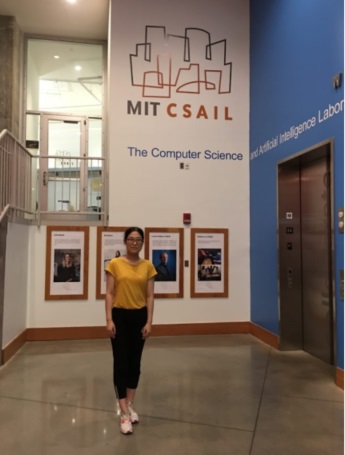 |
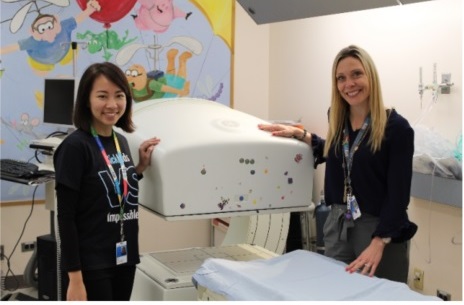 |
Case summary: Inbound and outbound student exchange arrangements were successful practices throughout 2016 to 2019 by 114% growth. PolyU was the leading university in HK to recruit undergraduate (UG) students from Africa, Central Asia, and Qatar (via physical trip). During the abovementioned period, the exchange number and abroad study opportunities increased as well. UG summer research abroad which was launched in 2015/16 provided 6–10 weeks of research in top 50 institutions and the study abroad fund supported 455 students in 2018/19. This was mainly improved throughout the implementation of strategies to integrate students before they depart to the targeted universities to improve their study trip experience. Because of the emergence of COVID19, almost 1/3 of students called off their exchange in semester 2, 2019/20, if the semester of their host institutions commences after February. Many of the remaining 2/3 ended their exchange early and returned to Hong Kong after the announcement of the pandemic and launching of travel restrictions and quarantine arrangements. All outbound activities were suspended in semester 3. For 2020/21, there were only 10+ students who traveled to China, S. Korea, and Singapore. Some exchanged to China were Mainlanders who have been in China since Nov 2019. No physical inbound was taken place for the entire 2020. Only a few students continued their exchange virtually. We were not able to arrange any occasion for inbound students, returned students, and to-be outbound students to get together and mingle. Once the situation allows the facilitation of physical face-to-face activities, this project will be resumed.
Developing Multidisciplinary and Multicultural Competences through Gamification and Challenge-Based Collaborative Learning – Dr. Eva Wong and Dr. Theresa Kwong (HKBU)
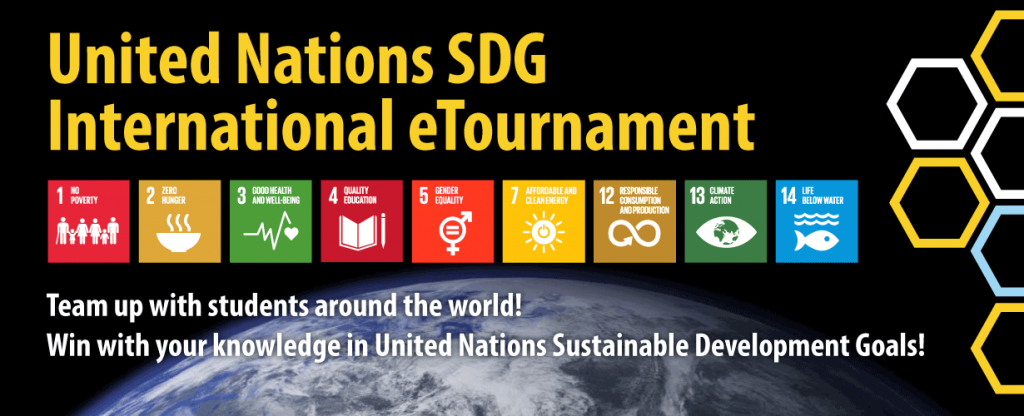 |
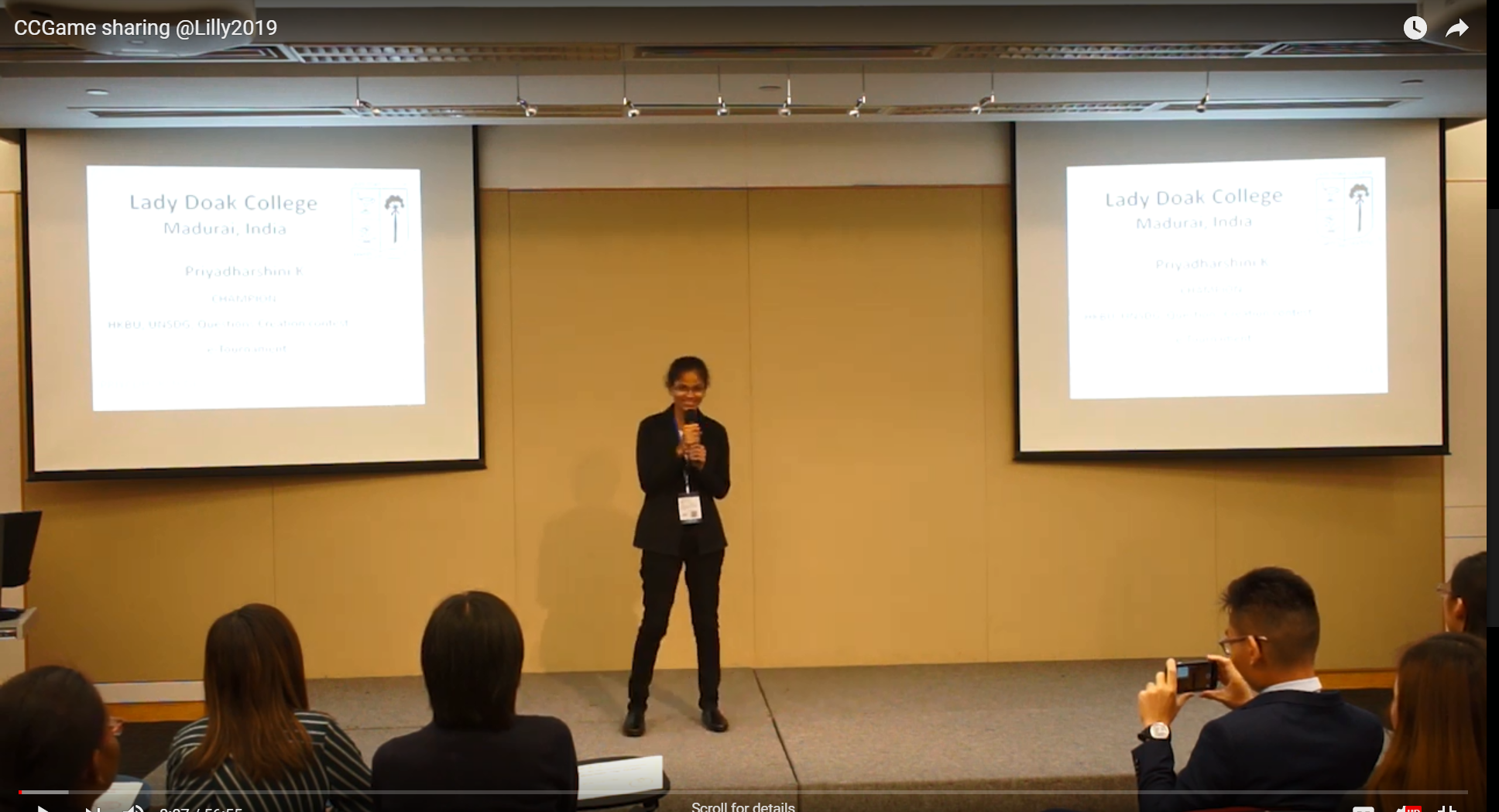 |
| Figure 1. A promotional banner of the eTournament. | Figure 2. A winner of the eTournament from India sharing her learning experience at the Lilly-Asia Conference 2019. |
Case summary: In light of the fact that citizens of today’s world are facing increasingly complex and fuzzy problems that cannot be solved unilaterally, this project secures a primary objective in enhancing students’ readiness to work in multi-disciplinary and multi-cultural team settings via gamification and challenge-based learning. It also aims to raise students’ awareness of the United Nations Sustainable Development Goals (SDGs) by engaging students of different cultural and academic backgrounds in a team-based eTournament. The eTournament was organised in 2019 and 2020 respectively. The eTournaments utilised a two-stage “strategise-play” approach. Students enrolled through an open global recruitment, were put into a team with a special team formation mechanism to ensure the diversity of each team. The teams first got acquainted with their unfamiliar teammates and formulated the strategies for the second stage, using messaging apps. Then, the teams competed on the PaGamO gaming platform, by answering SDGs questions and getting resources such as virtual land according to the formulated strategies. The teams also shared their experience on SDGs through online meetings. The 2019 eTournament attracted 243 students from 24 home countries/regions, and the 2020 run attracted 416 students from 42 home countries/regions. The outcomes of the initiative have been disseminated through conferences and publications – notable ones were the first-ever Lilly-Asia in 2019 and an eSymposium in 2020. The project has also been recognised by the global education sector with the attainment of international awards. Going forward, the team will leverage existing partnerships and seek new sponsorships to extend the project and benefit the wider student and academic communities. This initiative was evaluated by the following items:
- Pre- and post-game surveys: To collect participants’ feedback on the experience of the eTournament, intercultural competence (using GPI), as well as their perception of an increase in SDGs awareness, and general quantitative and qualitative feedback on the eTournaments.
- Learning analytics PaGamO: Quantitative evaluation of students’ awareness of SDGs.
- Text-mining of the teams’ chat histories on Moodle and instant messaging platforms: For analyses of discussion behavior of the teams, particularly the comparison between those by the high-performing teams and the low-performing teams.
Awards
- · QS Quacquarelli Symonds Reimagine Education Awards 2020 – Silver Award in ELearning
- · Association for Learning Technology 2020 Learning Technologist of the Year Awards – Highly Commended Award (Team) · eLearning Forum Asia Awards 2019 – Community Outreach Silver Award
- · The 6th e-Learning Excellence Awards 2020 at European Conference on e-Learning – Merit
Refereed Journal Articles
- · Kwong, T., Ko, T., Lau, M., Mui, L., Law, L., & Wong, E. Y. W. (2020). “CCGame Project: Helping Students Work Better in Diversified Online Teams to Address Global Issues through an International SDG eTournament”. In D. Remenyi (Ed.), 6th e-Learning Excellence Awards 2020: An Anthology of Case Histories (pp. 113–128). Academic Conferences International.
- · Law, L., Lau, M., Leung, Y. W., Kwong, T., & Wong, E. Y. W. (2020). “Gamification for Teamwork Skills: Can a Challenge-based Online Tournament Help Students Learn New Knowledge Collaboratively in Teams?” Global Research in Higher Education, 3(2), 63-84. https://doi.org/10.22158/grhe.v3n2p63
Raising Intercultural Awareness through Campus-wide Video Orientation at Hong Kong Universities – Prof. Mike K P SO (HKUST)

case summary: To facilitate and promote on-campus internationalization and raising student' intercultural awareness, the video clips about "Connect internationally on campus to improve your results and your employment opportunities" broadcasts inside and outside the classrooms for arousing students' awareness towards intercultural engagement in their university life. This initiative was evaluated by questionnaire, and the audience of this video orientation is around 5000-6000 students from three Hong Kong universities during the orientation period. The video broadcasts inside and outside of their classroom for arousing student’s intercultural awareness.



